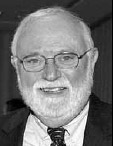
November 1, 2017
The estimable Gerard Doherty, a Charlestown guy who went to Malden Catholic and Harvard College in the late 1940 and early 1950s, was elected a state representative in 1956 at the age of 28.
While he was still at Harvard, Doherty was part of the Townie crew that helped Jack Kennedy win his US Senate seat in 1952. He was part of the reelection campaign in 1958, and on the team for the winning run for the presidency in 1960. Two years later, now a lawyer out of Suffolk Law School, he ran the campaign to elect 30-year-old Teddy Kennedy, JFK’s youngest brother, to the seat once held by the president.
A legendary figure in Boston politics for seven decades, Doherty recently published a memoir entitled, “They Were My Friends – Jack, Bob and Ted.”
For me, highlights from the stories he tells are his recollections about EMK’s first campaign in 1962, when he was challenged by then-Attorney General Edward J. McCormack. The contest was known as “Teddy vs. Eddie,” and as a fresh-faced BC High grad, I campaigned that summer with other young people as one of the “Students for McCormack.”
The campaigns rented space side-by-side in downtown buildings where the Tremont on the Common apartments now stand. We McCormack supporters got to see young Teddy frequently, and every time we saw his car coming down Tremont Street, two or three of us would run outside to greet – make that taunt – him with McCormack for Senate signs.
The Kennedy campaign slogan was “He Can Do More for Massachusetts.” We countered that with a pair of bumper stickers: “I Back Jack”… “But Teddy isn’t Ready.”
The campaign featured a now-famous debate at South Boston High School in McCormack’s boyhood neighborhood, where my candidate joined the chorus, saying, “Teddy, if your name were Edward Moore, your candidacy would be a joke.” Kennedy was shaken by the attack, and I can still hear the tremble in his voice as he gave his prepared closing remarks.
“It was an interesting debate,” Doherty recalls in his book. “Ted and McCormack went back-and-forth. Considering McCormack’s extensive experience with debate and Teddy’s lack of experience, Teddy did OK.
“By the end of the debate, Teddy was furious at McCormack. I was the first one up to Teddy and I congratulated him and I said let’s go. He said, ‘I’d like to go and punch him in the nose.’ I told him you’re not going to do that, let’s go.
I moved him quickly out of the auditorium. We waited for the verdict.
“The general perception of the public expression on radio talk shows was that Teddy held his own and if anything he came off more positive than McCormack. There was no doubt he was a more visibly pleasant person. Those that heard the debate on the radio thought that McCormack won, while those who watched it on television thought Ted won. The TV camera showed McCormack snarling and grimacing when he talked.”
I was there in Southie High that night. Near the end, four of us McCormack students jumped in the car and raced back to headquarters to create our own “spin room.” In short order we captured the phones to a WMEX 1510 radio talk show hosted by a guy named Jerry Williams, and managed to hold all four lines. We took turns swapping phones, proclaiming that McCormack was the clear winner.
For those few moments, we McCormack operatives alternated the phones back-and-forth, each time changing our neighborhood and trying to disguise our voices.
When it was my third time to identify myself with some fictitious name and address, I couldn’t come up with a good story – I was from Dot, the Rozzie, but where from now? I started to laugh.
Suspecting something fishy, the talk master went to commercial break, his producer hung up all the lines, and the connections we had controlled were gone – forever. It was the beginning of the end for us, and as we would learn, for the McCormack campaign.
Still, for a few minutes after the debate, Eddie was beating Teddy 8 to 2.
It was, I think, the only lead McCormack ever had in the whole campaign!

